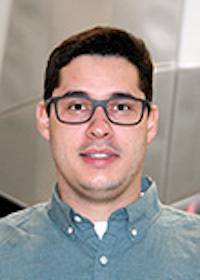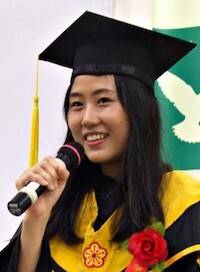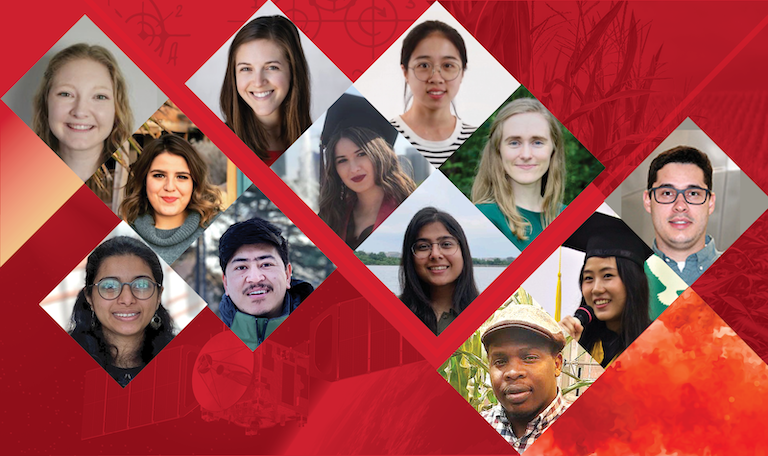Twelve Iowa State University graduate students have been selected to receive $120,000 in Brown Graduate Fellowship Program funding to support strategic university research over the next year.
Established in 2011 and administered by the Office of the Vice President for Research (OVPR), the annual Brown Graduate Fellowship Program is used to advance Iowa State research in the areas of study covered by the Valentine Hammes Family and Leopold Hammes Brown Family Trust, which include science, agriculture, and space science. Each year, an internal review committee selects a group of Ph.D. or master’s degree students from across the university to receive $10,000 each in institutional funding, which can be used to enhance existing fellowships, partially fund a fellowship, or assist with recruitment of new graduate students.
This year’s 12 award winners were selected by a committee composed of research faculty from across campus. Selection for the 2022-2023 awards was based on nomination letters provided by candidates’ respective director of graduate education (DOGE).
“Iowa State University truly values the next generation of innovators who are creating, sharing and applying knowledge to make Iowa and the world a better place,” said Vice President for Research Peter Dorhout. “We greatly appreciate the vision of the Valentine Hammes and Leopold Hammes Brown families to establish the Brown Graduate Fellowship Program that supports the scholarly pursuits of some of our institution’s most exceptional graduate students.”
2022-2023 Brown Graduate Fellowship Program Recipients
 Recipient: Bibek Byanju
Recipient: Bibek Byanju
Degree Program: Food Science and Technology, Ph.D.
Nominated By: Buddhi Lamsal — Professor of Food Engineering and Bioprocessing
Lamsal: “Bibek’s Ph.D. research involves utilization of co-products of corn wet milling industry for higher-value biochemical, food, and feed ingredients through fermentation, high-power sonication, and extrusion technologies, helping to advance Iowa State research in the field of food science and technology. With his research and findings, agro-industrial waste could be reduced, and by-products utilized for higher-value products with better economic impact, health, and [a more] sustainable environment.”
 Recipient: Jialu Wei
Recipient: Jialu Wei
Degree Program: Plant Breeding, Ph.D.
Nominated By: Asheesh Singh — Professor of Agronomy
Singh: “Jialu’s research projects on stress tolerance and phenotypic plasticity have a great potential impact on plant breeding and agricultural production. Her dissertation research is designed to a) investigate maize heat stress response mechanisms at molecular, biochemical, and whole-plant levels and b) identify genetic and environmental factors underlying phenotypic plasticity observed for flowering time and plant height across diverse sorghum accessions.”
 Recipient: Tiffanie Stone
Recipient: Tiffanie Stone
Degree Program: Environmental Science, Ph.D.
Nominated By: Thomas Isenhart — Professor of Natural Resource Ecology and Management
Isenhart: “[Tiffanie] uses empirical data collection and modeling techniques that require large datasets to examine the characteristics of existing food systems and predict those of future systems with changes in production and consumption of local foods. Her research in this arena is also a key part of a larger transdisciplinary effort (the “Iowa UrbanFEWS” project led by investigators at Iowa State as part of the NSF [National Science Foundation] “Innovations at the Nexus of Food, Energy and Water Systems” grant program) to investigate environmental and social impacts associated with changing land use, farming practices, and consumer behavior in the Des Moines, Iowa area.”
 Recipient: Maya Irvin-Vitela
Recipient: Maya Irvin-Vitela
Degree Program: Psychology, Ph.D.
Nominated By: Jonathan Kelly — Professor of Psychology
Kelly: “Maya’s interest in aggression, dark personality traits, and conduct disorder led her to develop a set of research questions for her master’s thesis, for which she plans to use data from a national multi-site longitudinal research study called the Adolescent Brain and Cognitive Development (ABCD) study. Maya’s thesis research has the potential to significantly advance our understanding of gender differences in conduct disorder and has far-reaching clinical and theoretical implications.”
 Recipient: Melisa Alkan
Recipient: Melisa Alkan
Degree Program: Chemistry, Ph.D.
Nominated By: Gordon Miller — Professor of Chemistry
Miller: “Melisa has accomplished seminal results in the area of theoretical chemistry and high performance computing. She is developing quantum chemistry algorithms that are designed to take optimal advantage of the world’s most powerful supercomputers. In the area of reaction mechanisms, Melisa carries out quantum chemistry calculations to investigate specific reaction pathways to add useful functionality to alkene molecules using a palladium metal catalyst. The products of these reactions are conformationally rigid ketones that have a range of applications in medicinal chemistry.”
 Recipient: Brian Zebosi
Recipient: Brian Zebosi
Degree Program: Genetics and Genomics, Ph.D.
Nominated By: Joshua Selsby — Professor of Animal Science
Selsby: “Brian’s graduate research has addressed two projects related to genetic factors that control plant architecture in maize. In the first project, Brian characterized the molecular genetic basis of a novel genetic variant affecting plant height and ear and tassel structure. In addition, Brian has established a whole new research area focused on biosynthesis of and signaling driven by the plant hormone, brassinosteroid. Brian has also demonstrated skill in science communication and in so doing, gained the attention of external scientists in the larger maize genetics community.”
 Recipient: Jacinta Correia
Recipient: Jacinta Correia
Degree Program: Molecular, Cellular, and Developmental Biology, Ph.D.
Nominated By: Mohan Gupta — Associate Professor of Genetics, Development, and Cell Biology
Gupta: “Jacinta has already published two co-authored peer reviewed papers, an impressive accomplishment this early in her scientific career. Jacinta has made several intriguing discoveries about how different subcellular organelles communicate to maintain the overall health and homeostasis of cells experiencing stress. She also recently worked highly independently to establish a ‘seahorse assay’ to measure mitochondrial oxygen consumption rate in cultured human cells by herself. Jacinta has established herself as an outstanding researcher and scholar in the MCDB program.”
 Recipient: Yukti Dhingra
Recipient: Yukti Dhingra
Degree Program: Biochemistry, Ph.D.
Nominated By: Richard Honzatko — Professor of Biochemistry, Biophysics, and Molecular Biology
Honzatko: “Over the past year, Yukti has solved the first cryo-EM structures at Iowa State University, which will soon lead to high-impact, first-authored publications. Yukti is studying the role of Cas4 proteins in the adaptation stage of bacterial CRISPR-Cas immune systems. As an untested beginner, she produced functional Cas4, and successfully reconstituted the Cas4-Cas1-Cas2 complex with DNA. Yukti’s structures answer several long-standing questions.”
 Recipient: Alana Pauls
Recipient: Alana Pauls
Degree Program: Materials Science and Engineering, Ph.D.
Nominated By: Ralph Napolitano — Professor of Materials Science and Engineering
Napolitano: “[Alana] was part of a team that developed the first soft lithography methods using metals and co-authored two publications. This work has led to development of the so-called “no-heat” solders for low-energy microelectronic fabrication and fabrication of metal-semiconductor interconnects at unprecedented low temperatures. The high quality, visibility, and broad relevance of Alana’s work on metastable metals has helped to position Iowa State University on the scientific frontier in the areas of low temperature solder, printed hybrid electronics, and soft lithography.”
 Recipient: Cicero Pola
Recipient: Cicero Pola
Degree Program: Mechanical Engineering, Ph.D.
Nominated By: Pranav Shrotriya — Professor of Mechanical Engineering
Shrotriya: “Cicero is currently doing research on the design and analysis of graphene-based electrochemical sensors for the detection of relevant food safety and public health targets including virus, foodborne pathogens and food allergens. Among his achievements is his number of peer-reviewed publications. He has already published 22 peer-reviewed articles in high impact journals, 15 peer-reviewed articles since he joined Iowa State University, five book chapters, [and] one patent. These are all a testament of his dedication and research excellence.”
 Recipient: Susanne Je-Han Lin
Recipient: Susanne Je-Han Lin
Degree Program: Veterinary Pathology, Ph.D.
Nominated By: Jodi Smith — Associate Professor of Veterinary Pathology
Smith: “The focus of [Susanne’s] work is investigating pathogenetic mechanisms of swine dysentery, toward understanding how dietary fiber may play a role in expression of the disease. [She] is also concurrently pursuing residency training toward board certification in veterinary anatomic pathology, and her progress in that regard has been equally outstanding. Susanne collaborates with multiple PIs by taking part in animal experiments, developing animal models for infectious disease and provides histopathology support to researchers under the guidance of our faculty pathologists.”
 Recipient: Kristen Greteman
Recipient: Kristen Greteman
Degree Program: Rural, Agricultural, Technological, and Environmental History, Ph.D.
Nominated By: Kathleen Hilliard — Associate Professor of History
Hilliard: “[Kristen] focuses her research on the now ‘lost’ Lake Cairo in Hamilton County, Iowa. Reading manuscript resources, personal accounts, folklore, newspapers, soil reports, government records, archaeological reports, and ISU Extension and Experiment Station publications alongside geomorphological, topographical, anthropological, biological, and dendrochronological data, she considers the meaning and value of this place—and the nature of “place” generally—over time. Her interdisciplinary research on Iowa’s agricultural landscapes has recently earned her the Iowa History Center’s Outstanding Thesis Award.”
The post 2022-2023 Brown Graduate Fellowship Cohort Announced appeared first on www.research.iastate.edu.


